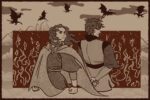This may be Patrick Radden Keefe’s most comprehensive work to date. “Say Nothing: A True Story of Murder and Memory in Northern Ireland” is exactly that — true. Keefe focuses the work on the abduction of Jean McConville, a 38-year-old woman and mother, by the IRA. But, the book is so much more than that. At its heart, “Say Nothing” is a nation’s reckoning with a vicious struggle, whose bloody stains are still being dealt with today.
The history of the Troubles, as the Northern Ireland conflict is often called, primarily spanned the years between 1968 and 1998. The struggle was characterized by the split between the majority Protestant unionists and the republican Roman Catholics. The unionists wanted Northern Ireland to stay a part of the United Kingdom, while the republican Roman Catholics fought for the province to become part of the Republic of Ireland. Although the conflict seemed to be (and often was) an entirely sectarian split, the anger between the unionists and republicans was much more deeply rooted in their sense of identity: Irish or British. Although the conflict technically ended in 1998 with the “solution” of a power-sharing Northern Ireland Assembly under the Good Friday Agreement, even today, the question of who the citizens of Northern Ireland identify as is a tenuous one.
Jean McConville, the persona non grata whom Keefe’s work begins with, was abducted in December of 1972. She was taken, dragged from her home by intruders and forced into a car. Her 10 children never saw her again. Keefe describes how McConville was a Protestant married to a Roman Catholic. He traces the lives of the 10 children after their mother’s abduction, and finally at the end of the book, places a finger on just who might have orchestrated the entire murder. For, as you find out, Jean McConville was murdered.
From there, Keefe takes the reader down a veritable rabbit hole, telling the stories of Dolours Price and her sister Marion, two of the most terrifying and dedicated members of the IRA (Irish Republican Army). Keefe also weaves in the history of one of the most charismatic politicians Britain and Ireland knew: Gerry Adams, the man whom Keefe identifies as having “refashioned his persona from guerilla leader to statesman.”
But how did Patrick Radden Keefe manage to dig up all of this long-buried information? Keefe makes no mistake about it: Snitches, or “touts,” as they were called in Northern Ireland, often wound up face down in a ditch. The solution was a feat of ingenuity. Boston College, long known to have strong ties to Ireland, created an archive with voice recordings of members of the conflict. The project was headed by Anthony McIntyre, an independent historian and a former member of the IRA. Ever so secretly, countless members of the Troubles were interviewed, but with one caveat. Their stories could only be released after their death. The IRA wouldn’t tolerate “touts,” and so this was the macabre solution. Traumatized soldiers from both sides could speak openly about the bombings, shootings and the killings with the knowledge that by the time the information came to light, they would be long gone from this world.
“Say Nothing: A True Story of Murder and Memory in Northern Ireland” is an intricate account, and Keefe tells it magnificently. Yet, when reading it, the tendency to become lost in the gray areas, the acronyms and the minutiae is unfortunately common. More of an observation than a critique is the transfer of the spotlight from Jean McConville to the stories of the members of the IRA. Dolours and Marion Price, Brendan Huges, Gerry Adams — these are the names that take up most of the work. It is undeniable how critical each of these people were to the functioning of the IRA. In order to understand the history of the conflict, it is necessary to know their backstories, their actions — yet I found myself wishing to know more of McConville. I wished to know more about what was (and tragically, what wasn’t) done to bring her murderers to justice.
“Say Nothing” is a literary reckoning. It is a reckoning between the people of Northern Ireland and the conflict that has characterized those six counties for centuries. But more than that, it speaks to the enduring nature of conflict, of oppression, of brutality. The current civil unrest that we are experiencing: the police brutality, the white supremacy, the extremist religions who influence governmental policy — these too are decades-long conflicts ever so slowly being unburied, and torn down.

















